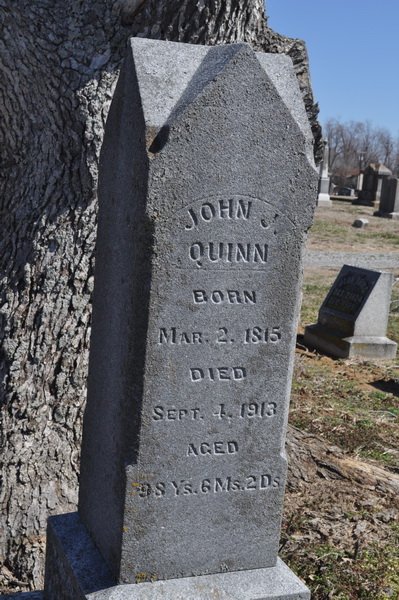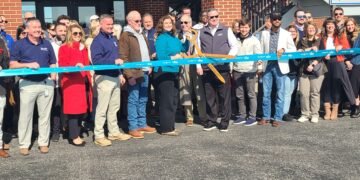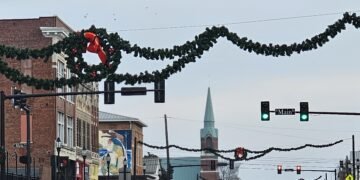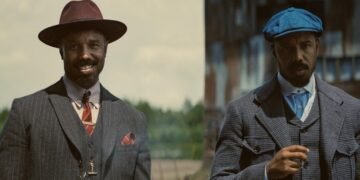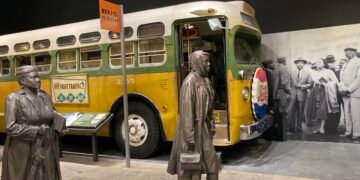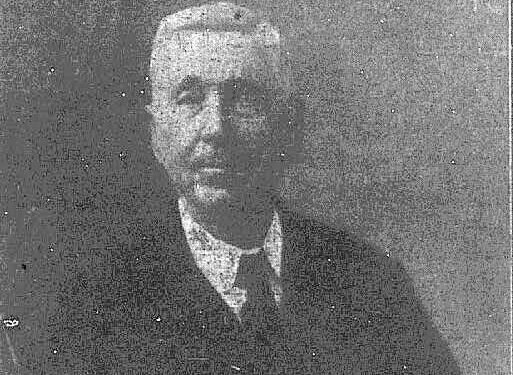(This article first appeared in the November print edition of the Hendersonian.)
Everyone cheered when “Uncle Jackie” hobbled to the polling place in 1912 to vote for president.
John Jackson Quinn was Henderson County’s oldest man at that time and universally loved. It was reported that every business in Corydon closed for his funeral the following year.
He was born March 2, 1815, in a log cabin in Bullitt County and stayed there until 1828, according to a story about him in the Henderson Journal of 1911 observing his 96th birthday. Upon his death in 1913 an almost exact copy of that story was used as his obituary.
At age 13, he helped his father build a log raft on the Salt River, which they floated down to the Ohio River and thence to Henderson. “They remained in camp in what is now the business section … and finally settled between Corydon and Cairo.”
The Gleaner of Oct. 4, 1910, noted Uncle Jackie—as he was known in his later years—had been in Henderson the day before “looking half his years. He was talking (about Henderson as it was in 1828) and said at that time there were only about 500 inhabitants and only three brick houses in the place.”
On Oct. 25, 1836, John Livesay, the first minister of Corydon Christian Church, married Jackie to Julia Ann Rayburn, who was one year younger and a native of Logan County. Jackie cast his first vote for president a couple of weeks after the wedding.
“The first president I ever cast a vote for was Martin Van Buren when I was 21 years old,” Jackie said in 1911, “and the last was for William Jennings Bryan. I have been for Bryan ever since he made his first race and will vote for him again if he runs.”
Jackie also dabbled a bit in politics. On Oct. 25, 1841, Albert G. Collier resigned as constable and Henderson County Court immediately appointed Jackie to take his place, according to county court order books. Jackie was appointed again on Oct. 23, 1843, and served through 1845.
Jackie also was a magistrate with Henderson County Court 1859-60 and held court the third Monday of each month. That was the end of his public service, though, possibly because he became a resident of newly formed Webster County.
Of the 20 civil court actions Jackie was a part of between 1846 and 1875 only one took place in Webster County. Of the others, half involved collection of debts, one of which was filed by Jackie to collect a debt of $315.
Another suit, which was settled within a month, claimed that Allen J. Sugg had fenced off four acres on Canoe Creek.
Jackie was the defendant in most of those 20 cases. One suit, filed by James Thomas in 1862 claimed that Jackie and brother Samuel F. Quinn owed $202 for hiring a slave in 1858. The Quinn brothers won that one.
The brothers were defendants in six other cases filed in 1860, most of which were about bad debts, which leads me to believe they may have had something to do with the destruction of Jackie’s mill in Poole that year.
All in all, 1860 was not a good year for him. But let’s go back to the 1911 Journal story to get y’all caught up.
“In 1854 he went to Arkansas on horseback (where some of his relatives were living) and made the trip in 30 days. He remained there for several months….
“After he returned from Arkansas in 1854, he located at Poole … and engaged in the flour, grist and sawmill business. In 1860 his hand was badly mashed, and he never had good use of it afterward. In the same year his mill burned, and he retired from the milling business and engaged in farming” two miles from Corydon.
“He was a tobacco farmer and beekeeper all his life,” according to a write-up that relies mostly on oral family history in the 1888-1978 History of Henderson County.
Jackie sat out the Civil War, according to the 1911 Journal story. “On account of his hand being crushed the year before the Civil War, Mr. Quinn was exempt from service, but he could tell many stories of the happenings during that period.”
Julia Ann Quin died at age 77 on May 10, 1893, and was buried the next day in the Corydon Cemetery. Jackie had his name also put on the vaulted obelisk tombstone – but had the date of his death left blank. The Henderson Journal of Sept. 7, 1913, carried a notice from A.B. Sode of Evansville. “Sode sent word to the family Saturday that he would send a stone engraver to Corydon the first of the week to complete his contract.”
Jackie continued farming well into the 20th Century, according to the 1911 Journal story. It said he lived on his farm “until a few years ago,” at which time he moved in with a granddaughter—Mary J. Turner—on Fourth Street in Corydon.
Both the Journal and The Gleaner tended to note his birthday every year once he reached the age of 95. The Gleaner of March 11, 1910, said he had just turned 95 and was “the oldest man in the county.” But he was leaving the next day to travel to Arkansas again.
The Journal of March 12 ran a longer story, giving Jackie’s recipe for long life and noting he was being accompanied by his granddaughter Cora McMullin.
His advice? Cut out all bad habits, eat in moderation, and stay active.
“Throw that chew of tobacco away,” he said. “Then you must live economically and don’t eat too much.
“I chewed tobacco for 40 years and found out it was doing me harm and then I quit short off and haven’t used it since.
“I used liquor some, but I don’t do it now; it’s a good medicine and it’s the abuse of it that makes trouble.
“I eat regularly, and I used to eat a lot of meat when I was younger and did hard work. I still use it in moderation.”
He stayed in Arkansas only a few weeks during his 1910 visit and late that year he had a nasty accident, according to the Journal of the next day. “While on his way to church Christmas Day … he slipped and fell on the frozen snow, breaking one of his ribs.” The Dec. 28 issue reported he also suffered a back injury. “The physicians say that if nothing prevents he will recover in a short time.”
On his 97th birthday, The Gleaner reported “he wants to be 100 years old before he leaves this world. Uncle Jackie is well known throughout the county. He visits this place often and can been seen on the streets walking as spry as a man half his age.”
But six months later he was hit by a stroke, according to the Journal of Aug. 4. “His recovery is not expected and it will probably only be a few hours before he is taken away.”
His health see-sawed over the next 10 days before he stabilized. The Journal of Aug. 8 reported he was “greatly improved” and the Aug. 15 edition said he was “improving rapidly and is expected to recover.”
But it was a month before he could leave his granddaughter’s house.
And he needed help to get to the Corydon polling place to vote, according to The Gleaner of Nov. 3.
“Mr. Quinn was not physically able to go to the polls but he refused to let this stand in the way. With the assistance of (two friends) who walked on each side of him and helped him along, he walked to the polls and voted the Democratic ticket straight. He was cheered by the few around the polls when he walked up.”
Like it had the last few years of his life, the Journal of March 2, 1913, ran a photo and a story on his 98th birthday.
“He is the oldest citizen of Henderson County, perhaps the oldest in the state, and stands alone in that he has voted in 19 presidential elections…. With one exception he has voted the Democratic ticket….
“Few men have led as moral and upright and upright life as he…. He has been an active member of the Christian church for many years.
“He is smooth-shaven and one would take him to be 20 years younger than he really is. Some of his children who are over 70 years old look as old as he.”
But the stroke he suffered in 1912 was leading to “softening of the brain,” according to his death certificate dated Sept. 4, 1913, when he slipped away.
“The weakening thread which held J.J. Quinn to this life snapped at 1:25 p.m., bringing to an end a life that had stretched over almost a century,” is how the Journal began its lead story the day he died.
“Mr. Quinn was as alert and as active as any man 60 years of age and attended to many little errands around his home, such as chopping wood, bringing in coal” and gardening. “He shaved himself almost every day and delighted in taking walks around Corydon.”
He had eight or nine children (sources differ) but only four were still living: Mrs. David McKibben and Benjamin Quinn of Bison, Arkansas; “Buck” Quinn of Little Rock, Arkansas; and George Quinn of the Corydon area.
“He leaves children, grandchildren, great grandchildren and great great grandchildren—124 descendants in all, scattered to the four corners of the globe.”
